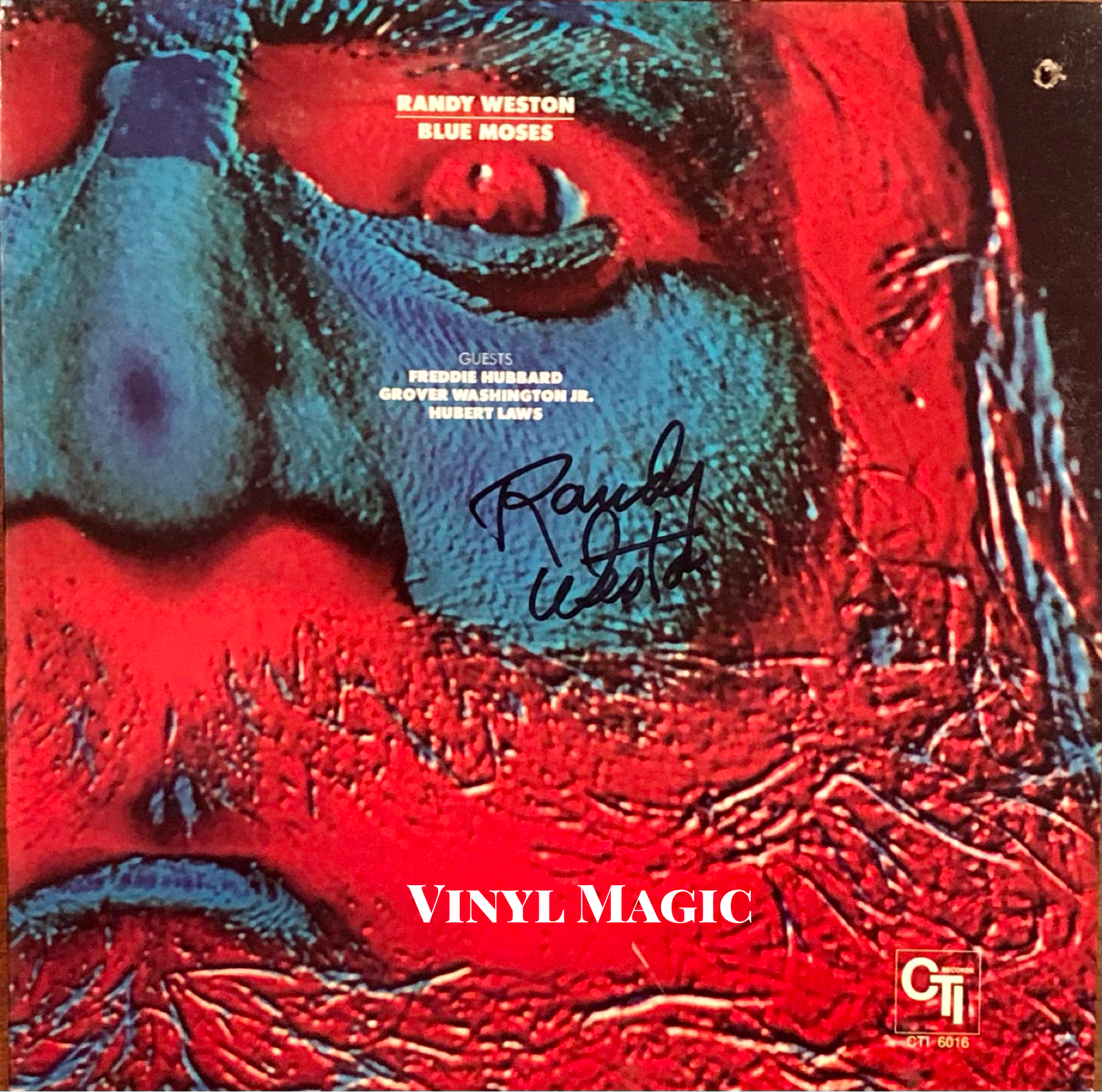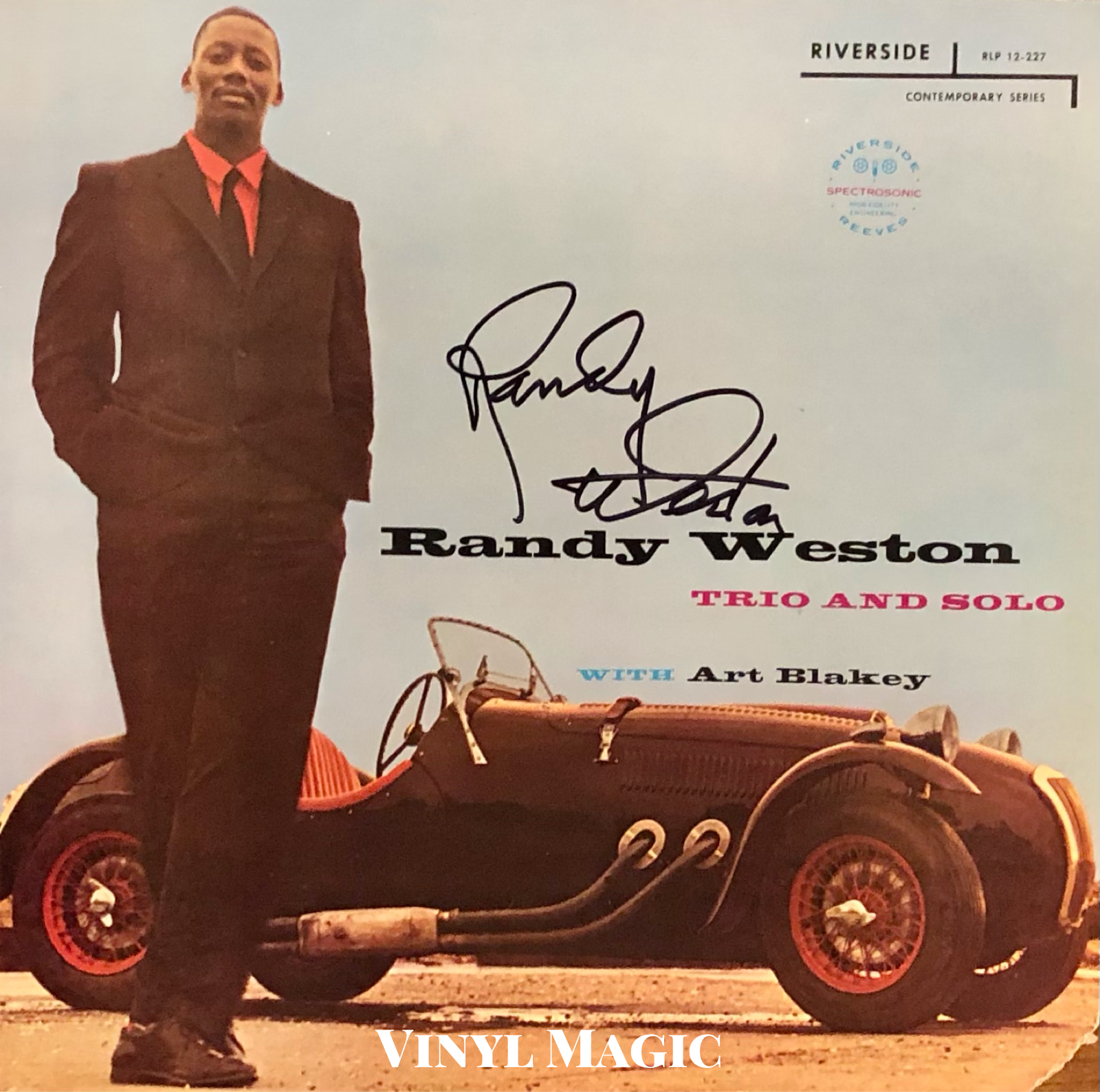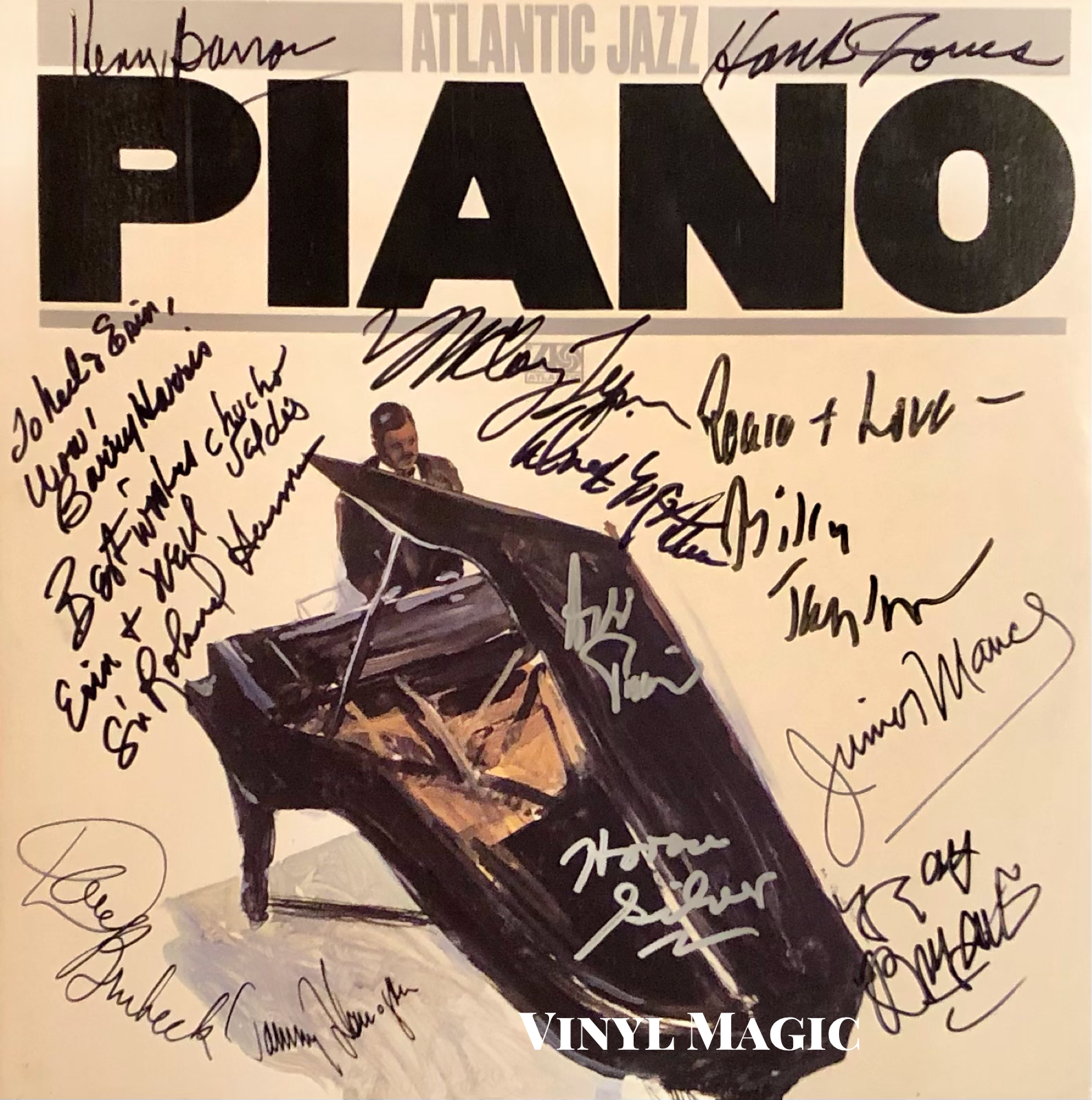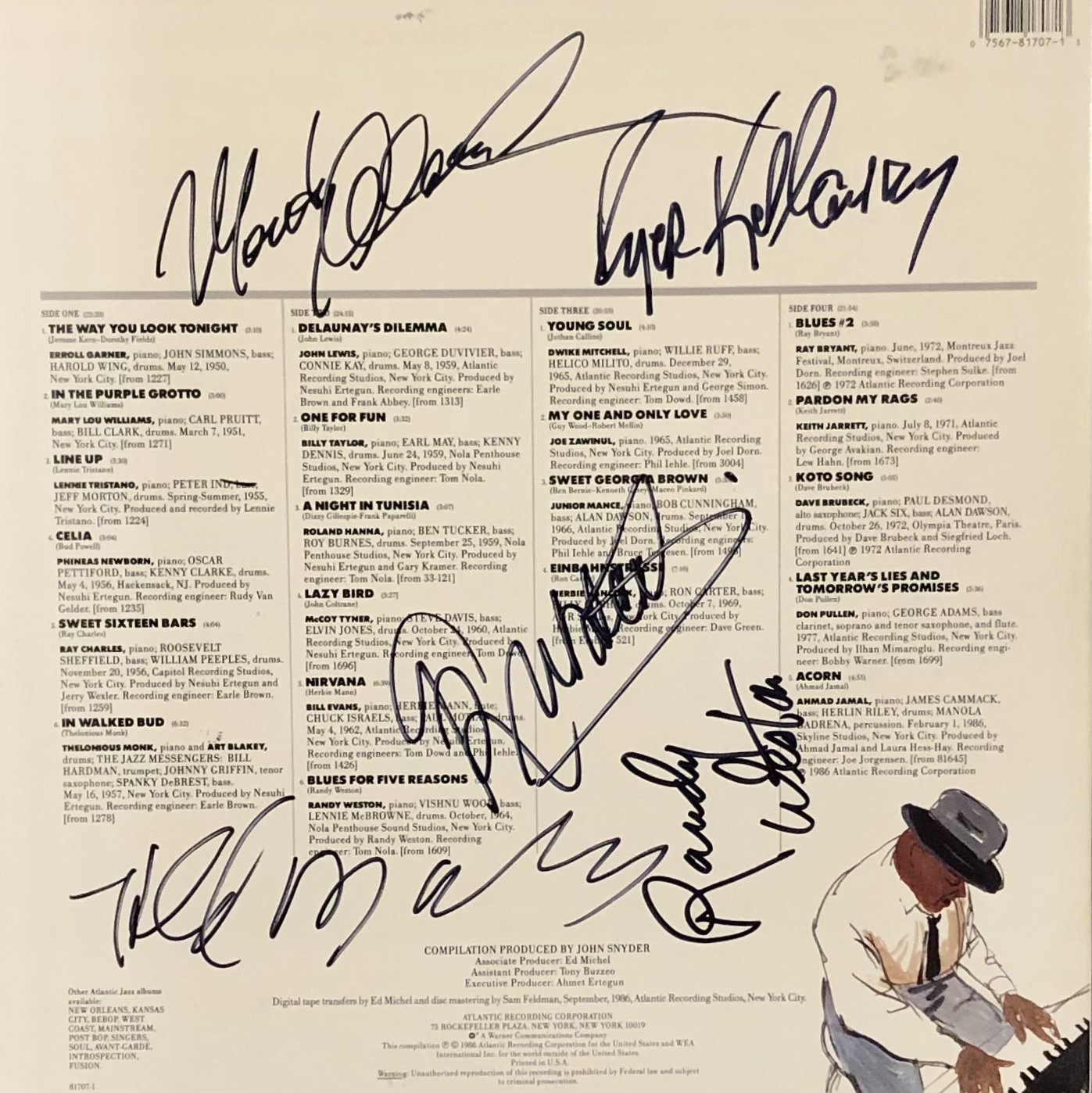Randy Weston and Me…
All music began in Africa. The ancient Egyptians had schools of music. They were the first ones to write music. They were master instrument makers of harps and flutes and horns. So the whole concept of music was created in Africa and then spread to Europe and spread to other parts of the world. Most people don't understand or realize that...They say that jazz began in New Orleans. That is ridiculous. This music began thousands of years ago. It was just carried on to European instruments, European languages. We have just not had the true history of Mother Africa, which has enriched the whole planet.
Randy Weston
When Randy Weston plays
a combination of strength and gentleness
virility and velvet emerges from the keys in an ebb and flow of sound
seemingly as natural as the waves of the sea.
author/poet Langston Hughes
Cole Porter In A Modern Mood (1954) signed by Randy
I just can't play the notes, I have to tell a story. I'll never forget, I met (tenor saxophonist) Lester Young in the '60s. He had some young musicians and they were playing a lot of notes, you know. He said, 'Excuse me sir, what's our story?' So when I approach the piano, I always have to tell a story.
Randy Weston
Whether you call it hip-hop or jazz or blues or bossa nova or samba or the black church, it all has that African pulse, that African spirituality. It’s the African pulse that’s in all of our music, wherever we were taken, whatever we came in contact with — whether it was a piece of wood, or a washboard, or a rubber band, or making music with our feet and our hands.
Randy Weston
Jazz a la Bohemia (1956) signed by Randy
Long before iTunes created a "World Music" category, there was Randy Weston. Randy's father instilled in him an insatiable curiosity and appreciation for African music, and this led to State Department sponsored trips in the early 1960s, which culminated in Uhuru Afrika (with lyrics by poet Langston Hughes) and Highlife: Music From The New African Nations. These recordings featured syncopated African rhythms with arrangements by Melba Liston, fueled by the brass of Clark Terry, Slide Hampton, and the rhythm of Kenny Burrell, Candido and Max Roach. Of course, Uhuru Afrika (Freedom Afrika) was immediately banned in South Africa along with other seditious titles like Lena Horne's Here's Lena Now! and Max Roach's Freedom Now! I guess I can understand that any vinyl extolling freedom might engender an alarmist and protectionist response from 1960s Apartheid-ridden South Africa, but who knew that Miss Lena Horne was such a dangerous subversive!
The Modern Art Of Jazz (1956) signed by Randy
Straight outta Brooklyn, Randy Weston is a formidable presence at the piano. There simply aren't that many six foot-eight inch practitioners resplendent in flowing African tribal garb. Classically trained and schooled at Boy's High in Bedford-Stuyvesant, Randy was influenced by two central figures: his father, Frank, and piano legend Thelonious Monk. Frank Weston, of Panamanian and Jamaican descent, was a staunch follower and adherent to the Pan-Africanist views espoused by Marcus Garvey. A Jamaican by birth, Marcus Garvey had come to prominence in the United States in the 1920s and formed the Universal Negro Improvement Association and African Communities League (UNIA-ACL) as well as the Black Star Line, a shipping and passenger line. Garvey sought to "redeem" the nations of Africa, to have Africa restored to the Africans and to get the European colonial powers to leave the continent. Though Garvey was controversial at the time, no less a hallowed figure than Dr. Martin Luther King understood his significance. When Dr. King visited Jamaica in 1965, he laid a wreath at Garvey's grave and said in tribute that Garvey "was the first man of color to lead and develop a mass movement. He was the first man on a mass scale and level to give millions of Negroes a sense of dignity and destiny. And make the Negro feel he was somebody." These views were imparted by Frank to Randy at an early age, "My son, you are an African born in America. Therefore, you have to study the history of Africa, when Africa had its great civilizations, before colonialism, before slavery."
Blues O Africa (1974) signed by Randy
The influence of Thelonious Monk loomed equally large in Randy's musical development. There was no one quite like Monk with his deconstructed melodies and dissonant phrasings. Many critics assailed him as a charlatan misplaying notes to which Monk famously replied, "The piano ain't got no wrong notes." Randy remembered their friendship, "I hung out with him. In the beginning, I didn’t understand what Monk was doing, but then I heard something. I met him and we hung out for about three years. I’d pick him up at his house in Manhattan and bring him back to Brooklyn, we’d go to places. He never said much, but his music…. For me, you can’t call this music jazz. This music is in touch with the ancient civilizations, the galaxies, the planets. By hanging out with him, I understood better (stride pianist) James P. Johnson, Ellington, all the people that preceded him, the history of piano. So the further you go back, you realize how humble you have to be today. And how they did what they did. It’s a miracle."
Throughout his impressive sixty-five year career, Randy has released more than fifty albums which meld the music of Monk, Ellington and Tatum with the poly-rhythms of African beats. Some of these rhythms Randy attributes to his nearly seven year stint living in Morocco, when he opened a night club, the African Rhythms Club: "In 1967, I was asked to do a tour by the State Department, and Morocco was the last stop. I felt a special bond with that country, because they also had experienced slavery. Our slavery came from over the Atlantic, theirs came from over the Sahara desert. I had a club in Tangiers for three years. We would bring over blues bands from Chicago, singers from the Congo, from Brazil, from Niger. I wanted to reflect the fact that African culture has become a global culture." It is not surprising that Harvard University sought out Randy and set up The Weston Archive in 2016. This repository houses Randy's extensive collection which includes three-hundred scores, and thousand of hours of audio tapes, films and photographs. It is a sweeping expanse that covers the breadth of Randy's life experiences, from Monk to Ellington, Dizzy Gillespie to Nina Simone, Langston Hughes to Dr. Martin Luther King, and everyone in between. More importantly, it is open to the public.
Blue Moses (1972) signed by Randy
I saw Randy Weston perform again at his recent ninety-first birthday celebration at the Jazz Standard in New York City on April 6, 2017. It was a festive and joyous occasion. When Randy took to the stage accompanied by his regular sextet, he said, "It is not many who cross ninety-one, but it appears that I have. I'm thinking tonight of my friend Jimmy Heath, who once told me, 'I'm Low Fly, you'll be Hi Fly.' " The reference to the diminutive Jimmy Heath (maybe five-foot four inches to Randy's imposing six-foot eight) got a chuckle, and then Randy launched into a beautiful piano solo on perhaps his best known composition, "Hi Fly", before the band kicked into gear. As a coda, Alex Blake scatted while slapping and thumping his upright bass in a way that only Bootsy Collins or Larry Graham could approximate. When Alex finished, Randy noted, " We have never done a version like that before. That's our April 6th version. Never before, never again." Another highlight was "The Call", with a bluesy, soulful alto saxophone solo by TK Blue amid the percolating and undulating African drum rhythms by percussionist Neil Clarke.
Live At The Five Spot (1959) signed by Randy, Roy Haynes
Then, Randy summoned a special guest to the stage, the ninety-six year old indefatigable conga extraordinaire, Candido. Randy and Candido share a rich history, going back to 1960 when they recorded Uhuru Afrika. Randy introduced Candido, "A man whose music to me has great healing qualities. He is a healer and a great friend." Two assistants helped Candido ascend the small stage, and Candido sat down, looked tentative and unsure as he began tapping on his conga. About five minutes in, the band stopped playing, and Candido began a call and response with the audience and started riffing on "Manteca", the Dizzy Gillespie/Chano Poza song that birthed Afro-Cuban jazz in 1947. Of course, Candido performed with Dizzy on the revelatory 1953 Afro recording, and his playing became crisp and taut as he laid out rhythms with his ninety-six year old hands over a ten minute (or more) drum solo. The crowd, including Randy, watched in awe with rapt attention. When he finished, Candido said, "You know, I'd like to thank my two assistants who help me. I couldn't walk down the block without them. I have such bad arthritis that, you know, when I walk on stage I feel like I'm one-hundred. But then when I sit behind my drums and play, I feel like I'm twenty! It's beautiful, just beautiful!" A huge smile lit up Candido's face. It was beautiful, and the music of Candido (and Randy) is certainly healing. They finished the set with the hypnotic groove of "Blue Moses", a mesmerizing end to a memorable show.
Trio And Solo (1956) signed by Randy
Afterwards, I visited with Randy. He is a gentle, kind and thoughtful soul. I mentioned that I saw him several times with former Count Basie trombonist, Benny Powell. He turned pensive, reflecting on their eighteen year association, "He was a beautiful man and we created some beautiful music. I miss him." He laughed when he saw the Trio And Solo vinyl. I asked, did you keep the car? what happened? "No, I don't know what happened to the car. I saw it once and never saw it again." Of Destry Rides Again, he laughed at the cowpokes saddled up to the bar, "This is not country and western music." Hardly, not with the trombones of Slide Hampton, Benny Green, Melba Liston and the drums of Elvin Jones and Willie Bobo. I thanked him for all the great tunes through the years, and wished him blessings on his birthday.
Destry Rides Again (1959) signed by Randy
In a recent interview, Randy reflected on his gratitude for his parents: ""That's my dad. That's my mom. I talk to them every day. Because they know that they gave us a certain spiritual discipline. So...you can't play this music and have hate in your heart. You can't be negative in your spirit when you're playing this music. Because they say music is the voice of the creator. So if the creator's given you this gift, what are you doing to do with it?"
Words, respect and truth. We are so blessed to share the gifts of Randy Weston and his music.
Atlantic Jazz Piano (1986) signed by Kenny Barron, Hank Jones, Barry Harris, Sir Roland Hanna, Chucho Valdes, McCoy Tyner, Billy Taylor, Junior Mance, Dwike Mitchell, Ray Bryant, Andre Previn, Horace Silver, Tommy Flanagan, Dave Brubeck
Atlantic Jazz Piano (1986) back cover signed by Monty Alexander, Harold Mabern, Gonzalo Rubalcaba, Randy Weston
Choice Randy Weston Cuts (per BKs request)
https://www.youtube.com/watch?v=47vdxkLj4nU
"Hi-Fly" Randy Weston Live At The Five Spot 1959
https://www.youtube.com/watch?v=XVcmwfkza08
"Ganawa (Blue Moses)" Blue Moses 1972
https://www.youtube.com/watch?v=yA7b17sdcXY
"Berkshire Blues" solo live 2014
https://www.youtube.com/watch?v=ovk5OSa8PrU
"Little Niles" With These Hands 1956 written for his new born son
https://www.youtube.com/watch?v=q_bFWCByTHA
"How High The Moon" The Modern Art Of Jazz 1956
https://www.youtube.com/watch?v=tmqRiQyeNkU
"The Call" The Spirits Of Our Ancestors 1992
https://www.youtube.com/watch?v=olot4dOPIts
"Caravan" Afro Dizzy and Candido swing Duke Ellington! 1953
https://www.youtube.com/watch?v=UBqCsgYf-z8
"Niger Mambo" Uhuru Afrika 1964
Bonus Track:
https://www.youtube.com/watch?v=j5Text6rBhs
"Marcus Garvey" Burning Spear live in studio









